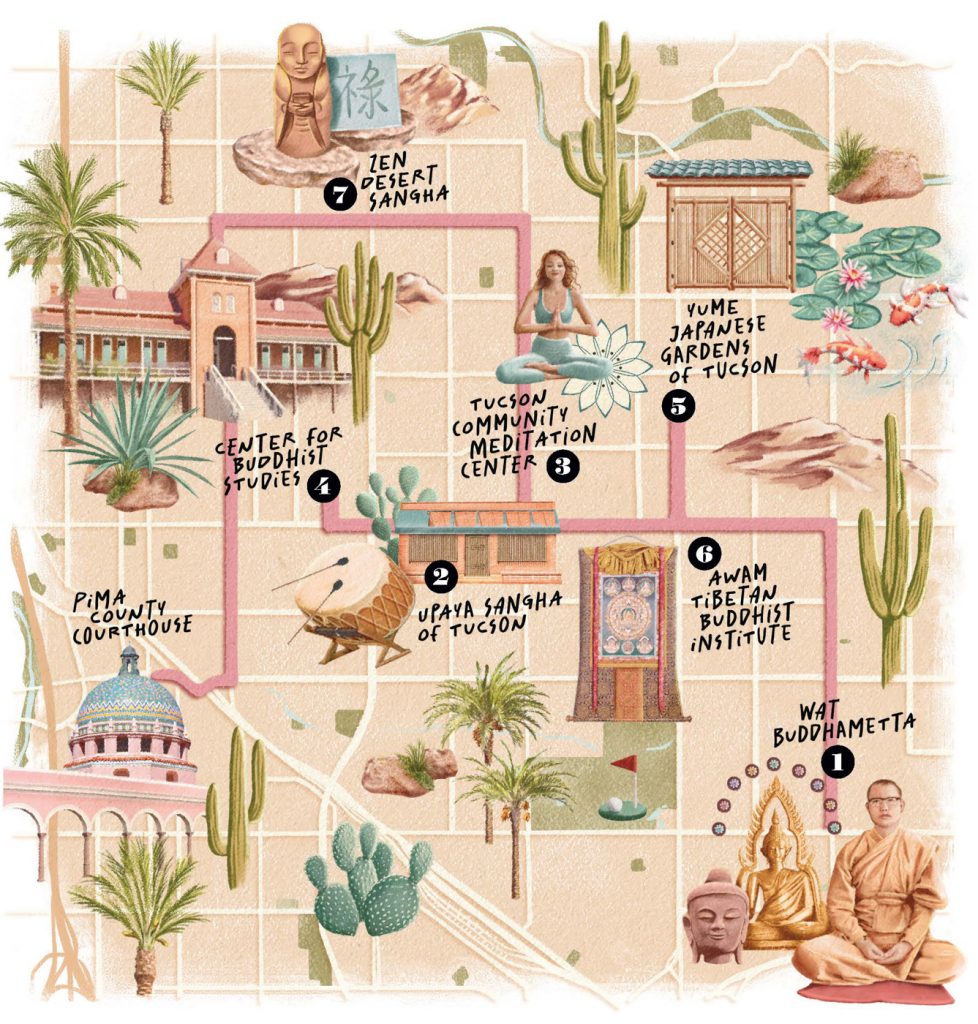Fresh and alive: that’s the Tucson of today. This slice of the Sonoran Desert has a vibrant religious history, including a syncretic blend of longstanding native beliefs and Catholicism brought by Jesuit missionaries. In the 19th century, Buddhism arrived with immigrants looking for work at the crossroads of the Old West. Throughout history, travelers have been welcomed by Tucson’s timeless natural beauty. Giant saguaros stand guard by day and diamond skies light the night. Take in a sunset here and you may never leave.
1| Wat Buddhametta
Founded in 2009 by Ajahn Sarayut Arnanta, Wat Buddhametta is a Thai monastery and meditation center situated on 3.5 acres in the city. Housed in a 1950s-era adobe structure, Buddhametta provides not only residence for Buddhist monastics but also a place of worship for Theravada practitioners.
On most Sunday mornings, Wat Buddhametta holds a ceremony featuring chanting, guided meditation, and refuge-taking, followed by alms/lunch. Occasionally, daylong meditation retreats are available for those wishing to deepen their practice.
1133 S. Swan Rd.
2| Upaya Sangha of Tucson
Founded by residents in 2009, Upaya Sangha of Tucson is one of three affiliates of the Upaya Zen Center in Santa Fe, New Mexico. The guiding teacher of Upaya Tucson is Sensei Al Genkai Kaszniak, who received dharma transmission from Roshi Joan Halifax, founding abbot of Upaya Zen Center. Upaya follows the Soto Zen lineage of Eihei Dogen in 13th-century Japan. Sensei Al leads the sangha in weekly meditation and dharma talks. Offering hybrid practice sessions online and in person, Upaya Tucson meets on Saturday mornings via Zoom and at the Tucson Community Meditation Center.
1147 N. Howard Blvd.
3| Tucson Community Meditation Center
A home for daily meditation practice, the Tucson Community Meditation Center is a refuge for the Buddhist traveler not far from the University of Arizona campus. It welcomes a diverse community along the path, offering classes in loving-kindness and mindfulness, the art of thriving, and circles of belonging.
On most days of the week, the center provides opportunities to join in guided meditations, yoga, a BIPOC peer-led practice group, and other classes of interest.
1147 N. Howard Blvd.
4| Center for Buddhist Studies
Just as the University of Arizona serves as the heart of Tucson, the university’s Center for Buddhist Studies functions as the academic core of Buddhist research in Arizona and beyond. The center is home to a collection of rare Buddhist archives and hosts activities including a lecture series, academic conferences, and contemplative studies.
A new home for the center is being planned within the Andrew Weil Center for Integrative Medicine. “This custom-designed facility,” Dr. Weil says, “brings together the concepts and philosophies upon which integrative medicine is built, and including the Center for Buddhist Studies is a crucial element in promoting health of the mind and spirit as well as body.”
Weil Center: 1502 E. Mabel St.
5| Yume Japanese Gardens of Tucson
Find an oasis of tranquility in the desert sands at Yume, or “dream,” in Japanese. Stroll quietly through courtyards that offer intimate views of classic Japanese imagery. Yume houses a Zen contemplative garden, a stone-and-gravel garden, and several grass and pond gardens. On the grounds, you’ll also find traditional Japanese folk art and the largest ikebana container exhibit in the United States. A recent exhibit, “The Sedge Hat and the Staff: A Journey to Zen,” addressed the extraordinary life of Zen priest Patricia Dai-En Bennage, who wrote the translator’s preface to Shundo Aoyama’s Zen Seeds. Look for unique workshops and events, like “Summer Haiku Walk: Flower Moon.”
2130 N. Alvernon Way
6| Awam Tibetan Buddhist Institute
Just off one of Tucson’s busiest streets lies a Vajrayana Buddhist organization “striving to help lay practitioners attain awakening in this lifetime.” Awam focuses on the Nyingma Dzogchen practice lineage, combining ancient, scholarly, and scientific sources for its teachings.
Yogi Khenpo Drimed Dawa serves as resident teacher at Awam’s sangha, which is committed to the householder yogi tradition. The temple also brings in master teachers for in-person and online classes and celebrations of festival days in the Tibetan calendar.
3400 E. Speedway Blvd.
7| Zen Desert Sangha
With its tranquil zendo and garden, Zen Desert Sangha hosts open discussions—“Circle meetings”—that focus on people, practice, or place, as well as dharma talks, sesshins, and “tea with the teacher” events. Zen Master Dan Dorsey has served as roshi since 2012. It is an affiliate of the Honolulu Diamond Sangha, founded by Robert and Anne Aitken.
The sangha welcomes anyone to attend its nighttime meditation sessions or its Saturday morning tea ceremony, zazen, work practice, and chanting. Check ZDS’s website for details before dropping in.
3226 N. Martin Ave.
Thank you for subscribing to Tricycle! As a nonprofit, we depend on readers like you to keep Buddhist teachings and practices widely available.
